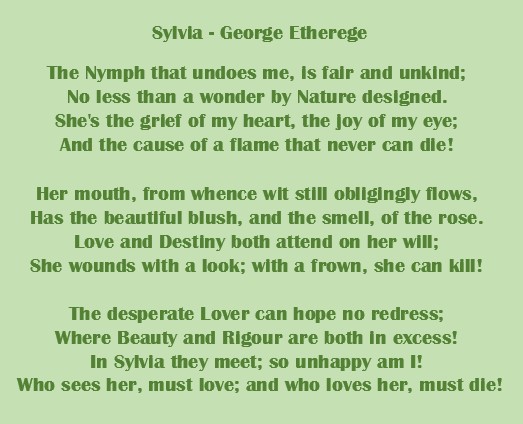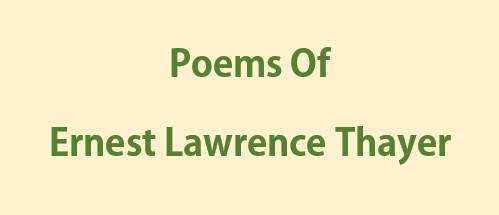lunes, 2 de mayo de 2022
domingo, 1 de mayo de 2022
Poems Of George Etherege - Poemas en inglés

Recursos Educativos en Inglés - Poems in English - Poesías en inglés
Sylvia - George Etherege
The Nymph that undoes me, is fair and unkind;
No less than a wonder by Nature designed.
She's the grief of my heart, the joy of my eye;
And the cause of a flame that never can die!
Her mouth, from whence wit still obligingly flows,
Has the beautiful blush, and the smell, of the rose.
Love and Destiny both attend on her will;
She wounds with a look; with a frown, she can kill!
The desperate Lover can hope no redress;
Where Beauty and Rigour are both in excess!
In Sylvia they meet; so unhappy am I!
Who sees her, must love; and who loves her, must die!
A Drinking Song - George Etherege
The pleasures of Love and the joys of good Wine,
To perfect our happiness, wisely we join!
We, to Beauty, all day.
Give the sovereign sway;
And her favourite Nymphs devoutly obey!
At the Plays, we are constantly making our Court;
And when they are ended, we follow the sport
To the Mall, and the Park;
Where we love till 'tis dark!
Then, sparkling Champagne
Puts an end to their reign.
It quickly recovers
Poor languishing Lovers!
Makes us frolic and gay; and drowns all our sorrow!
But, alas! we relapse again on the morrow!
Let every man stand
With his Glass in his hand;
And briskly discharge, at the word of command!
Here's a Health to all those,
Whom, to-night, we depose!
Wine and Beauty, by turns, great souls should inspire!
Present all together! and now, boys, give fire!
🔆 Read more Poems
Poems Of Ernest Lawrence Thayer - Poemas en inglés

Recursos Educativos en Inglés - Poems in English - Poesías en inglés
Casey At The Bat - Ernest Lawrence Thayer
The outlook wasn't brilliant for the Mudville nine that day;
The score stood four to two, with but one inning more to play,
And then when Cooney died at first, and Barrows did the same,
A pall-like silence fell upon the patrons of the game.
A straggling few got up to go in deep despair. The rest
Clung to that hope which springs eternal in the human breast;
They thought, "If only Casey could but get a whack at that--
We'd put up even money now, with Casey at the bat."
But Flynn preceded Casey, as did also Jimmy Blake,
And the former was a lulu, while the latter was a cake;
So upon that stricken multitude grim melancholy sat,
For there seemed but little chance of Casey getting to the bat.
But Flynn let drive a single, to the wonderment of all,
And Blake, the much despised, tore the cover off the ball;
And when the dust had lifted, and men saw what had occurred,
There was Jimmy safe at second and Flynn a-hugging third.
Then from five thousand throats and more there rose a lusty yell;
It rumbled through the valley, it rattled in the dell;
It pounded on the mountain and recoiled upon the flat,
For Casey, mighty Casey, was advancing to the bat.
There was ease in Casey's manner as he stepped into his place;
There was pride in Casey's bearing and a smile lit Casey's face.
And when, responding to the cheers, he lightly doffed his hat,
No stranger in the crowd could doubt 'twas Casey at the bat.
Ten thousand eyes were on him as he rubbed his hands with dirt;
Five thousand tongues applauded when he wiped them on his shirt;
Then while the writhing pitcher ground the ball into his hip,
Defiance flashed in Casey's eye, a sneer curled Casey's lip.
And now the leather-covered sphere came hurtling through the air,
And Casey stood a-watching it in haughty grandeur there.
Close by the sturdy batsman the ball unheeded sped--
"That ain't my style," said Casey. "Strike one!" the umpire said.
From the benches, black with people, there went up a muffled roar,
Like the beating of the storm-waves on a stern and distant shore;
"Kill him! Kill the umpire!" shouted some one on the stand;
And it's likely they'd have killed him had not Casey raised his hand.
With a smile of Christian charity great Casey's visage shone;
He stilled the rising tumult; he bade the game go on;
He signaled to the pitcher, and once more the dun sphere flew;
But Casey still ignored it, and the umpire said, "Strike two!"
"Fraud!" cried the maddened thousands, and echo answered "Fraud!"
But one scornful look from Casey and the audience was awed.
They saw his face grow stern and cold, they saw his muscles strain,
And they knew that Casey wouldn't let that ball go by again.
The sneer has fled from Casey's lip, his teeth are clenched in hate;
He pounds with cruel violence his bat upon the plate.
And now the pitcher holds the ball, and now he lets it go.
And now the air is shattered by the force of Casey's blow.
Oh, somewhere in this favored land the sun is shining bright;
The band is playing somewhere, and somewhere hearts are light,
And somewhere men are laughing, and little children shout;
But there is no joy in Mudville--great Casey has struck out.
🔆 Read more Poems
sábado, 30 de abril de 2022
viernes, 29 de abril de 2022
Cómo expresar opiniones en inglés

Gramática Inglesa - English Grammar - Recursos Educativos en inglés
Saber cómo expresar una opinión en inglés es muy útil en la vida cotidiana. A todos se nos pide con frecuencia que demos nuestra opinión en las conversaciones. Ya sea sobre la última serie que viste, el libro que leíste o cualquier otro tema de la vida diaria, podemos expresarnos -y lo hacemos- sobre cualquier cosa.
Por suerte es bastante sencillo, sólo hay que conocer algunas frases clave para empezar una frase de opinión.
Expresar una opinión en inglés
Con estas tres expresiones, puedes empezar a expresar tu opinión en la mayoría de las conversaciones:
- In my opinion… - En mi opinión...
- I think that… - Pienso que...
- I believe that… - Creo que...
I think that es uno de los más sencillos. I think that it’s true. I think that it’s not true. (Creo que es cierto.Creo que no es cierto).
Para decir que estamos de acuerdo, diríamos:
I agree. (Estoy de acuerdo) Recuerda: No se utiliza así: I am agree.
I disagree. No estoy de acuerdo.
Hay muchas otras muchas expresiones, por ejemplo:
- I consider that… - Considero que...
- As far as I’m concerned… En lo que a mí respecta...
- I must admit that… - Debo admitir que...
*** "According to" se corresponde con "Según". Se utiliza para citar fuentes. Por ejemplo, "According to the lawyer", "según este article", etc.
🔆 También te puede interesar:
- Uso de whose en inglés - Pronombres relativos
- Who, which y that - Pronombres Relativos en inglés
- Was going to - El futuro en el pasado
- DO y MAKE en inglés ¿Cuáles son las diferencias?
- Cuándo usar Since, For, Ago: ¿Cuáles son las diferencias?
- The Gerund - El gerundio en inglés
- El Imperativo en Inglés - Imperative
- El comparativo y el superlativo en inglés
- Preguntas con WH-Questions 01 - What, where, why, who
- Preguntas con WH-Questions 02 - When, Which, Whose, How
- Cómo expresar cantidades en inglés
- Adjectives - Los Adjetivos en Inglés
- Uso de some / any acompañando nombres contables/incontables
- Modal verbs - Verbos modales en inglés
- El tiempo futuro en inglés
- Present Perfect Progressive - Presente perfecto progresivo
- Present perfect - El presente perfecto inglés
- Pretérito progresivo o continuo en inglés
- Simple past - El pretérito o pasado simple en inglés
- Presente continuo - Forma Afirmativa - English grammar
- Presente continuo - Forma Negativa
- Puntuación en inglés - All about punctuation in English
- Los verbos Auxiliares en inglés - Auxiliary Verbs
- Verbos irregulares en inglés, la lista que debes conocer
- Cómo decir la fecha en inglés - How to say the date in English
- Construir frases simples - To build a simple sentence
- Nombres contables e incontables en inglés
- Presente continuo - Forma Interrogativa
- Cómo Preguntar y decir el precio en inglés
Was going to - El futuro en el pasado

"Sí, iba a hacer la comida, pero finalmente alguien me vino a visitar".
En esta frase "Iba a hacer la comida", es una acción planificada, una intención. Fue una pequeña frase en la que usaste el tiempo futuro en el pasado.
Ahora, lo que aprenderemos es a expresar el mismo tipo de frases en inglés, especialmente con Was going to.
Was going to y el tiempo futuro en el pasado
Podemos utilizar "was going to" para hablar del futuro a partir de un momento del pasado: cuando hablamos de cosas que estaban previstas o de intenciones:
I was going to visit our London house, but my train was delayed. - Iba a visitar nuestra casa de Londres, pero mi tren se retrasó.
*** Es la intención que está en el pasado y que ha cambiado. El tiempo al que se refiere la intención puede ser tanto en el futuro como en el pasado:
Tomorrow we were going to go to the cinema but our car has broken down. Mañana íbamos a ir al cine pero nuestro coche se ha estropeado.
On Monday I was going to meet Anna, but she didn't show up. El lunes iba a quedar con Anna, pero no apareció.
Esta estructura también se utiliza para explicar por qué no se ha producido un hecho, para pedir una disculpa, para explicar un cambio de proyecto, para explicar un contexto:
I was going to invite Anna tonight. Do you think it’s a good idea? - Iba a invitar a Anna esta noche. ¿Crees que es una buena idea?
Hello Anna, I was going to send you a message today, but I totally forgot. Hola Anna, iba a enviarte un mensaje hoy, pero se me olvidó por completo.
We were going to have breakfast together, but we decided to meet for lunch instead. Íbamos a desayunar juntos, pero decidimos reunirnos para almorzar.
Was going to es una forma fácil de recordar para expresar una intención que tenías, o una acción que habías planeado. Por supuesto, hay otras formas de hablar del futuro en el pasado (veremos dos de ellas a continuación), pero si sólo recuerdas Was going to, ya serás capaz de expresarte en la mayoría de las situaciones.
También podemos utilizar los tiempos perfectos con "going to" para expresar diferentes perspectivas en el pasado:
He has been going to clean the garage for months. I don’t think he ever will.
Hay otras estructuras que pueden utilizarse para hablar del futuro en el pasado. El pretérito continuo puede usarse para arreglos en el pasado:
I was meeting the lawyer at 5pm. He quedado con el abogado a las 17h.
En el estilo más formal, "was/were to" puede utilizarse para hablar de planes y acuerdos:
We were to hold a live interview this day, but some technical problems prevented us from doing so. Este día íbamos a realizar una entrevista en directo, pero algunos problemas técnicos nos lo impidieron.